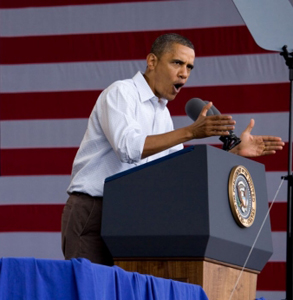Obama's Tax War
A tax-and-spend liberal on the war path?
 President Obama may avoid the newly unpopular word, but he remains on the stimulus path. What he's trying to stimulate in his scorching speeches in Milwaukee and Cleveland is the fortunes of the Democratic party. Obama's attempted comeback is consistent with the pattern of his presidential campaign and presidency--wait until the last second, then try to pull off the big victory. Will it work this time?
President Obama may avoid the newly unpopular word, but he remains on the stimulus path. What he's trying to stimulate in his scorching speeches in Milwaukee and Cleveland is the fortunes of the Democratic party. Obama's attempted comeback is consistent with the pattern of his presidential campaign and presidency--wait until the last second, then try to pull off the big victory. Will it work this time?
Obama is hauling out the the old Democratic chestnuts about the "millionaires and billionaires" looting the American economy. Their taxes, Obama says, need to go up, in the form of refusing to rescind the looming expiration of the Bush cuts on marginal tax rates. In other words: class warfare. It's a tactic that has served Democrats well in the past, but it likely won't have much effect in the November elections. The problem isn't that taxes are too low on the wealthy. It's that the millionaires and billionaires Obama is referring to have also suffered big losses in the past few years. The Treasury is collecting less in revenues because the wealthy aren't making as much money in a depressed economy.
Sure, Obama can threaten to go after the malefactors of wealth and it may (mildly) stimulate the Democratic base. But come the next Congress, it's highly unlikely that taxes will go up. Even Peter Orszag, Obama's recently departed budget director, says they shouldn't (though he's now slightly qualifying his own statement). Anyway, Democrats being Democrats, they're already feuding internally over the Bush tax cuts. As Doyle McManus observes, "after the November election, it seems increasingly likely that a lame-duck Congress will extend the tax cuts for everyone. And that will be the only form of stimulus we're likely to see for a while."
What about the flip-side of Obama's rhetoric about chasing down the millionaires? His actual proposals are garnering some praise among conservatives. The Wall Street Journal editorial page notes that Obama's ideas for business tax credits and accelerated write-offs for capital investments make good sense: "John McCain could sue for plagiarism becase versions of both ideas were part of his 2008 campaign platform."
The truth, as David S. Broder observes is that Obama, in practice if not rhetoric, is moving toward the center. He's going to run with Republican ideas, repackage them as Democratic ones, and dare the GOP to reject them. He's doing it in foreign policy as well. In an astute piece, Glenn Kessler says that Hillary Clinton is starting to embrace the idea of America as the indispensable nation. In a speech at the Council on Foreign Relations, Clinton announced a "new American moment" in foreign policy. America, she said, "has "no rival" in creating shared efforts to solve problems--"the world looks to us." This sounds like neocon-lite--and it will help insulate Obama from criticism on the right, at least when it comes to foreign affairs. Note that Weekly Standard editor William Kristol expressed his delight with Obama's speech about the end of formal combat in Iraq.
The Obama administration may end up looking as different as Congress after the midterm elections. Whether or not the Obama administration shuns the term, it's going to be a stimulating next two years.
